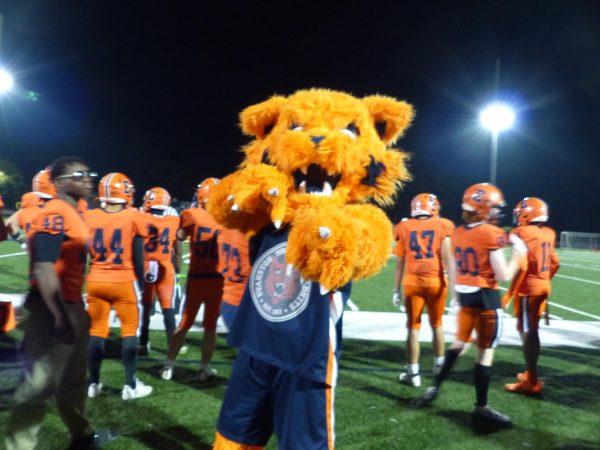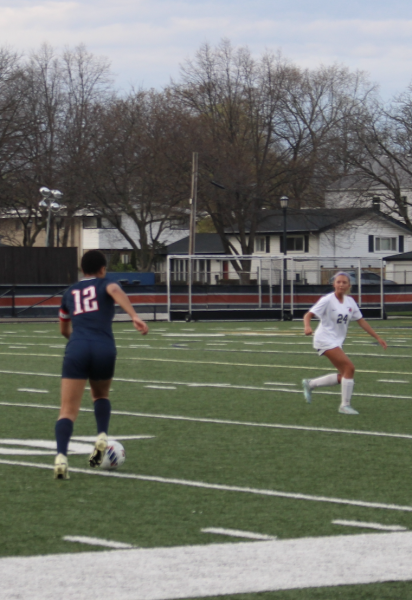Athletes reflect on nutritional habits, education
January 27, 2023
It’s gameday.
The only thing on your mind is winning. You’ve put in countless hours this week in practice, putting your full effort into each drill, each sprint and each scrimmage in preparation for this very moment.
The crowd starts to file in, the bleachers begin to fill and the referee is about to blow the whistle. A rush of adrenaline runs through your body, but suddenly, you start to feel all out of sorts.
Gameplay starts, the clock ticks, and as you begin to run, you start to cramp. The side-stitch hits your oblique and you immediately wince in pain. You try your hardest to keep up but this muscle twinge is preventing you from keeping up. Not only is it going to hinder your ability to stay in the game for the time being, it’s going to affect your performance throughout the entire contest. You wonder if your pregame meal should’ve been different…
“One time I downed twenty Chicken McNuggets right before sprints because I was hungry, but I immediately threw up. Eating unhealthy foods right before a game— you’re going to have bad results,” says Alex Mahoney, varsity boys soccer goalie.
Nutrition plays an integral part in an athlete’s success on the playing field, as performance largely depends on what an athlete is putting into their body. The concept of eating well plays as important a role as practicing does, but ETHS student-athletes have very limited resources about nutritional habits to refer to in order to achieve their maximum potential on the field.
Mahoney highlights that although himself and his teammates are generally aware of decisions they need to make regarding their nutrition, there aren’t many discussions about the topic that stem from the coaching staff.
“In my experience, there isn’t really that much of an emphasis on a nutrition plan from our coaches,” Mahoney states. “If you’re not eating right, you’re not going to play well. I think most people on our team already have a good nutrition plan, but there’s nothing currently in place to reinforce those good habits.”
One source of information surrounding nutrition that all ETHS students receive comes from semester-long, sophomore Wellness classes. A graduation requirement, the class has multiple units that encompass personal decision making, stress management, consent, drug education, safety and nutrition. However, due to the busy curriculum the course offers, the amount of information that students can obtain is limited. Mahoney stresses that while the course is important, presentations catered to each specific sport are necessary to ensure athletes are well-informed on decisions that can make or break their success on the field.
“Having some sort of guideline to direct people on [what to eat] to keep them focused would be beneficial,” Mahoney states. “Obviously, Wellness is a sophomore class that we take but having a more substantial or long term thing implemented into the Athletics Department could keep everyone motivated and on the same page.”
Girls basketball coach Brittany Johnson is doing her part in educating her athletes about the importance of nutrition but wants to see more resources and time devoted to nutrition-based discussions with the team. Johnson emphasizes that in order to see results in games, young athletes must be aware of what they put into their bodies.
“I think [nutrition] is really important. Young athletes don’t think about nutrition a lot— I don’t even think I thought about it as much until I went to college and worked with a nutritionist and had a training table,” says the former Boston College basketball standout. “You have all these meals that are designed for you. You see the benefits of it and I think exposure is important. The more they’re exposed to the knowledge of how important nutrition is in their lives, the more they’ll understand and see the results in practices and contests.”
But it’s not just about educating students on the importance of what they’re putting into their bodies, it’s also teaching them to put something into their bodies altogether.
When a meal is skipped, your body’s glucose levels start to diminish, leaving your cells hungry for energy. According to Brigitte Zeitlin, founder of New York’s BZ Nutrition, this can lead to sluggishness, muscular weakness and trouble focusing—three things that significantly affect any person’s day to day activities, let alone student-athletes.
“The importance of [nutrition] is definitely huge. There’s people, especially with morning practices, who don’t eat beforehand, and it’s easy to tell when they’re slowing down and not at their best,” says girls soccer player Sydney Ross. “Even sometimes when I don’t eat before, I feel like I’m moving a little slower. My brain isn’t working as quickly.”
An article written by pediatric experts from Nationwide Children explains that developing healthy eating plans can lead to injury prevention, muscle recovery, energy boosts and increased focus—all crucial factors to athlete’s execution in gameplay. This is something that Johnson understands, aiming to get her team thinking about nutrition early on each season, typically in preseason meetings.
“[The coaching staff] tries to get [our team] thinking about what they’re putting in their bodies and then getting them to understand that things like water are a friend to them during the season, in and out,” Johnson explains.
Outside of education-based programs, ETHS offers meals for students, including free breakfast and after-school snacks for students. Although, there is certainly more room for additional programs to be put in place to support the athletes.
“Having healthy nutrition is similar to practicing or doing reps when working out. It’s all in the same sort of lifestyle to maintain a good performance in your sport,” Mahoney says.
“You can’t have the same program for say, a football player and a swimmer, which is what is currently offered. You’re giving virtually the same speech to everyone, so seeing a nutrition program tailored to your sport would be very useful.”














